新概念英语第二册第40课-Food and talk
新概念英语第二册第40课课件
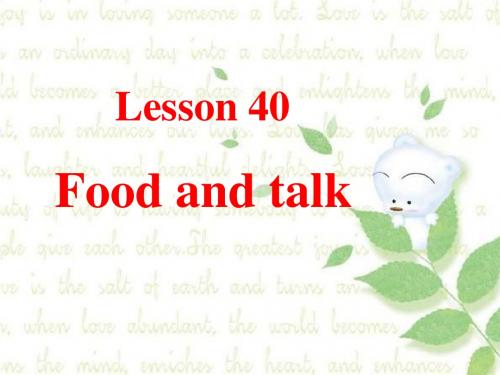
对将来的愿望
对过去的愿望
would/ might/ could+动词原形
过去完成时
I wish (that) I were a bird. I wish (that) I could fly.
I wish (that) I had forgotten it.
2.用于表示命令、建议、要求等一类词后面的宾语从句。 insist, order, command, suggest, advise, propose, require, request, demand, decide 等 We suggested that the meeting (should) be put off. They insisted that the boy (should) go with them. 注意:suggest 当表示“暗示、表明“讲时,insist 表示”坚持认为“之意时,应用陈述语气。 The smile on his face suggested that he was satisfied with our work.
想迫使对方做出明确答复时,将来进行时可以 显得比一般将来时will更委婉客气。
3. Last week at a dinner party, the hostess asked me to sit next to Mrs. Rumbold. 介词at通常用于小型集体活动之前,比较大型的活动会用介词in。 at a meeting(在会议上);at a concert(在音乐会上);at a wedding(在婚礼上)等等。 4. Mrs. Rumbold was a large, unsmiling lady in a tight black dress. unsmiling的反义词是smiling(微笑的,喜气洋洋的)。有些形容 词前面可以加上前缀un-l来表示相反的意思,比如: comfortable-uncomfortable;true-untrue;interesting- uninteresting等等。 5. She did not even look up when I took my seat beside her. Take a seat和take one’s seat都表示“让某人坐下”,这种用 法要比sit down更加正式。 by/beside是贴近的旁边;而near是有一段距离的附近。所以,句 子中的beside可以用by互换
新概念英语第二册Lesson40 Food and talk 课件
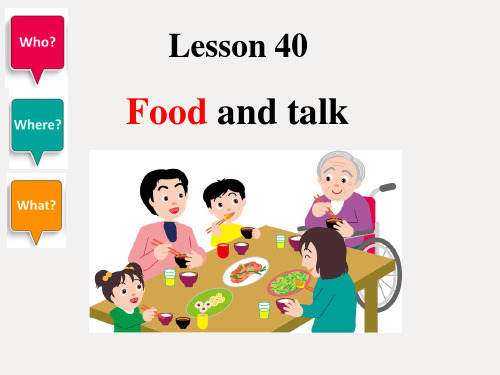
If my whole family were..., ...
Exercise
lost don't apologize
were tries
will burn would have to
won
1. “Are you tired?” she asked. She asked if you were tired.
he talk about the holidays or not? (and) 4. Did she answer his questions briefly or not? 5. Did he ask her if she was enjoying her dinner or not?
What did she answer? (Then…and)
Discus and Answer
Answer these questions. 1. Where did the writer sit at the dinner party? 2. Did he try to make conversation or not? Was she busy
eating or not? (but) 3. Did he talk about the new play at ‘The Globe’ or not? Did
2.“Will you be staying in England?”I asked. I asked if you would be staying in England.
3.“Will you be seeing it” I asked. . I asked if you would be seeing it.
signs.
新概念英语第二册 lesson 40 Food and talk

Read after the story
Last week at a dinner party , the hostess asked me to sit next to Mrs. Rumbold.
fix [fɪks]
v. 凝视
n. 地球
globe [gləʊb]
despair [dɪ'speə]
hostess n. 女主人 actress 女演员 goddess 女神
n. 绝望
→host n. 男主人 →actor 男演员 →God 上帝
tight adj. 紧身的
The woman in a tight skirt is an air hostess. 这个穿紧身裙的是名空姐 补充:2. adj.吝啬的 The old man is tight with money. 这个老头很吝啬钱 3. adj.拉紧的;绷紧的 She tied the rope around the post and pulled it tight.
Watch the cartoon and then answer these questions
• Q1: Where did the writer sit at the dinner party?
The hostess asked me to sit next to Mrs. Rumbold.
• Q2: How was the conversation between the writer and Mrs. Rumbold?
新概念英语第二册Lesson40foodandtalk课件
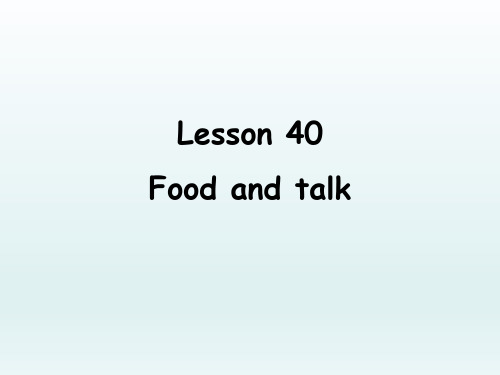
‘In despair, I asked her whether she was enjoying her dinner.’ 7. in despair 失望
Focus on grammar
1. If you park your car in the wrong place, a traffic policeman will soon find it.
句则推测想象的结果。 与现在事实相反的虚拟条件句 结构: if从句------一般过去时(be用were) 主句-------过去将来时(would/could/might/should+do) eg: If you ate more and talked less, we would both enjoy our dinner. If I were you, I would not go to the party.
overcoat.
A. But
B. Although C. How
D. What
Fill in the blanks 1
Food and talk Last week at a dinner party, the _h_o_s_te_s_s___ asked me to sit next to Mrs. Rumbold. Mrs. Rumbold was a large, _u_n_s_m_il_in_g__ lady in a __t_ig_h_t__ black dress. She did not even look up when I took my seat beside her. Her eyes were __f_ix_e_d__on her plate and in a short time, she was busy eating. I tried to make conversation. 'A new play is coming to "The __G_lo_b_e__" soon,' I said. 'Will you be seeing it?' 'No,' she answered. 'Will you be spending your holidays abroad this year?' I asked 'No,' she answered. 'Will you be staying in England?' I asked. 'No,' she answered. In _d_e_s_p_ai_r_, I asked her whether she was enjoying her dinner. 'Young man,' she answered, “if you ate more and talked less, we would both enjoy our dinner!"
新概念英语第二册Lesson 40 (共53张PPT)
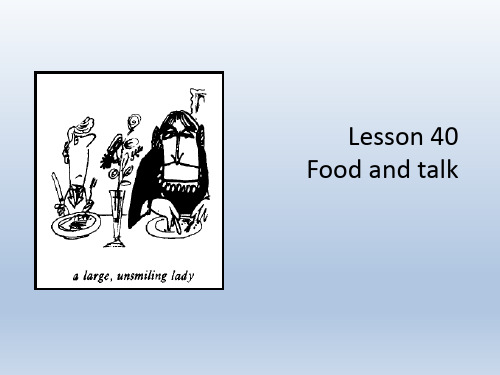
•
Text
• Mrs. Rumbold was a large, unsmiling lady • in a tight black dress.
• 修饰人外形的口语化形容词(体积) • big/large/huge
Text
• Mrs. Rumbold was a large, unsmiling lady • in a tight black dress.
Lesson 40 Food and talk
本课重点
Words and expressions hostess, unsmiling, tight Grammar 虚拟语气
Introduce the word
• T: Today we'll listen t a story about a man who goes to a dinner party.
• What did you ask her next? • Whether she would be spending her holidays
abroad this year.
WORDS
New words and expressions
New words and expressions
hostess n.
Text
• In despair, I asked her whether she was • enjoying her dinner. •
Text
• In despair, I asked her whether she was • enjoying her dinner. •
Text
新概念英语第二册第四十课
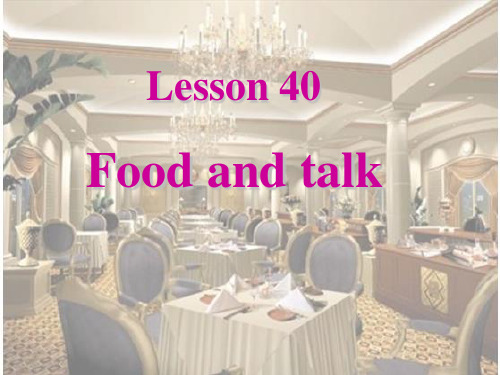
Toasting
Glass touch/finish
No glass touch/take a sip
•New words and expression 生词和短语 • hostess n. 女主人 unsmiling adj. 不笑的,严肃的 tight adj. 紧身的 • fix v. 凝视 globe n. 地球 • despair n. 绝望
• 与将来相反 • If he came here tomorrow,I would tell him about it. • If he were to come here tomorrow,I would tell him.
• -----What present do you think I should bring for my host family? were • ----If I ____(be)you,I would bring sth special.Like sth you make by yourself.
区别: If you help me, I will be grateful 真实条件句 If you helped me, I would be grateful非真实条件句
时间
现在
过去
将来
IF从句的谓语 主句的谓语形 形式 式 did/were would /could/should/ might+v原 had done would/could/sh ould/might+hav e+pp 1.did/were would 2.should do /could/should/ 3.were to do might+v原
• 与现在事实相反 If +主+did(were),主 +would/should/could/might+v原 • If I were you,I would try it again. • If I won the lottery(彩票), I would buy an expensive car. • If I had a lot of money, I would buy a villa别墅
新概念第二册Lesson 40 Food and talk讲义
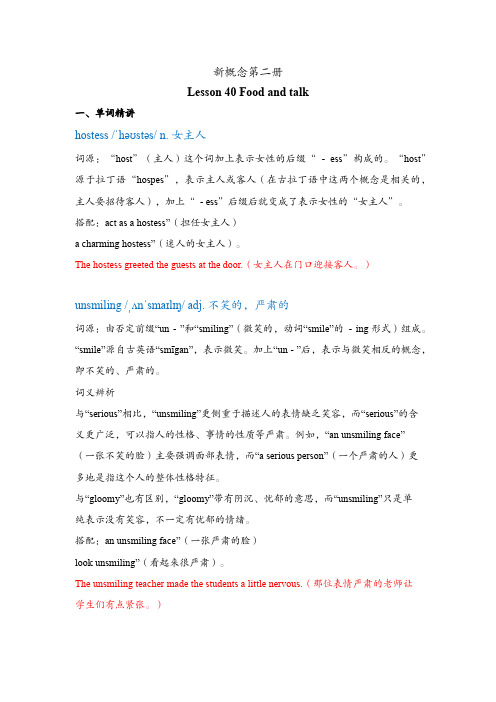
新概念第二册Lesson 40 Food and talk一、单词精讲hostess /ˈhəʊstəs/n.女主人词源:“host”(主人)这个词加上表示女性的后缀“-ess”构成的。
“host”源于拉丁语“hospes”,表示主人或客人(在古拉丁语中这两个概念是相关的,主人要招待客人),加上“- ess”后缀后就变成了表示女性的“女主人”。
搭配:act as a hostess”(担任女主人)a charming hostess”(迷人的女主人)。
The hostess greeted the guests at the door.(女主人在门口迎接客人。
)unsmiling /ˌʌnˈsmaɪlɪŋ/adj.不笑的,严肃的词源:由否定前缀“un - ”和“smiling”(微笑的,动词“smile”的- ing形式)组成。
“smile”源自古英语“smīgan”,表示微笑。
加上“un - ”后,表示与微笑相反的概念,即不笑的、严肃的。
词义辨析与“serious”相比,“unsmiling”更侧重于描述人的表情缺乏笑容,而“serious”的含义更广泛,可以指人的性格、事情的性质等严肃。
例如,“an unsmiling face”(一张不笑的脸)主要强调面部表情,而“a serious person”(一个严肃的人)更多地是指这个人的整体性格特征。
与“gloomy”也有区别,“gloomy”带有阴沉、忧郁的意思,而“unsmiling”只是单纯表示没有笑容,不一定有忧郁的情绪。
搭配:an unsmiling face”(一张严肃的脸)look unsmiling”(看起来很严肃)。
The unsmiling teacher made the students a little nervous.(那位表情严肃的老师让学生们有点紧张。
)tight /taɪt/adj.紧身的辨析:与“narrow”不同,“narrow”主要指宽度上狭窄,而“tight”侧重于物体对身体或其他物体的包裹程度紧。
新概念英语第二册第40课_Food_and_talk_进餐与交谈
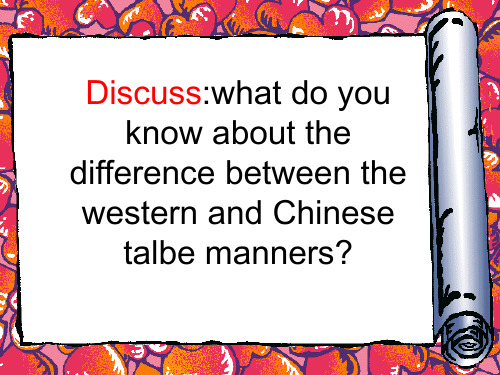
They are doing the dishes. 他们在洗盘子。
The workers are making the dishes. 工人们 在造盘子。
6.比较下列句子:Have you done the chairs? 你把椅子擦好了吗? Have you made the chairs? 你把椅子做好了 吗?
make和do用法区别
两词均有“做”之意,用法与含义相近,不易掌握。现将其宾语作 一比较: 1.说起某种活动而又不确指什么活动时,用do。如: Do somehing! 做点什么吧! I don't know what to do. 我不知道该做什么好。 2.做出以前没有的东西时,常用make,有“创造;建造”之意; 而进行某种活动时用do。如:Please tell the cook to make a fire. 请 告诉厨师生个火。 Let us make a model plane. 我们来做个飞机模型吧。 He has not done his homework. 他没做完家庭作业。 In the afternoon she did her lessons. 下午她做功课。 3.谈及工作时一般用do。如:I'm not going to do any work. 我将什 么工作也不做。
Watch the flash and answer the questions:
1.Where was I last week? 2.How does Mrs. Rumbold look like? 3.What was she looking at? 4.What was she busy with? 5.What did you try to do? 6.What did I ask her at last? 7.What did she reply?
- 1、下载文档前请自行甄别文档内容的完整性,平台不提供额外的编辑、内容补充、找答案等附加服务。
- 2、"仅部分预览"的文档,不可在线预览部分如存在完整性等问题,可反馈申请退款(可完整预览的文档不适用该条件!)。
- 3、如文档侵犯您的权益,请联系客服反馈,我们会尽快为您处理(人工客服工作时间:9:00-18:30)。
新概念英语第二册第40课:Food and talkLesson 40 food and talk进餐与交谈 First listen and then answer the question.听录音,然后回答以下问题。
Was Mrs. Rumbold a good companion at dinner?Last week at a dinner party, the hostess asked me to sit next to Mrs. Rumbold. Mrs. Rumbold was a large, unsmiling lady in a tight black dress. She did not even look up when I took my seat beside her. Her eyes were fixed on her plate and in a short time, she was busy eating. I tried to make conversation.'A new play is coming to "The Globe" soon,' I said. 'Will you be seeing it?''No,' she answered.'Will you be spending your holidays abroad this year?' I asked.'No,' she answered.'Will you be staying in England?' I asked.'No,' she answered.In despair, I asked her whether she was enjoying her dinner.'Young man,' she answered, 'if you ate more and talked less, we would both enjoy our dinner!"参考译文在上星期的一次宴会上,女主人安排我坐在兰伯尔德夫人的身旁。
兰伯尔德夫人是一位身材高大、表情严肃的女人,穿一件紧身的黑衣服。
当我在她身旁坐下来的时候,她甚至连头都没有抬一下。
她的眼睛盯着自己的盘子,不一会儿就忙着吃起来了。
我试图找个话题和她聊聊。
“一出新剧要来‘环球剧场’上演了,”我说,“您去看吗?”“不,”她回答。
“您今年去国外度假吗?”我又问。
“不,”她回答。
“您就呆在英国吗?”我问。
“不,”她回答。
失望之中我问她饭是否吃得满意。
“年轻人,”她回答说,“如果你多吃点,少说点,我们两个都会吃得好的!”New words and Expressions生词和短语hostessn. 女主人unsmilingadj. 不笑的,严肃的tightadj. 紧身的fixv. 凝视globen. 地球despairn. 绝望Lesson 40 自学导读First things first 课文详注 Further notes on the text1.next to, 挨着。
它既可以表示座位挨着也可以表示地理位置上挨着:Who was the man sitting next to you during the meeting?开会时坐在你旁边的那人是谁?There's a field/shop next to our house.我们家房子边上有一片田野/一个商店。
2.Mrs. Rumbold was a large, unsmiling lady in a tight black dress.兰伯尔德夫人是一位身材高大、表情严肃的女人,穿一件紧身的黑衣服。
(1)unsmiling的反义词为smiling(微笑的,喜气洋洋的)。
有些形容词前面可以加上前缀un-来表示相反的意义:comfortable (舒服的)/uncomfortable(不舒服的),true(真实的)/untrue(不真实的), interesting (有趣的)/uninteresting(无趣味的,乏味的)。
(2)in在这里表示“穿着”、“戴着”:A young man in a blue dress is inquiring for you.有位穿蓝衣服的小伙子在找您。
3.take one's seat, 在指定的位置上就座。
take a seat表示“坐下”,比sit要正式:Please take a seat.请坐。
take one's seat则表示位置事先已安排好:After everyone had taken his seat, the meeting/dinner party began.大家各自就座后,会议/宴会便开始了。
4.Her eyes were fixed on her plate and in a short time, she was busy eating. 她的眼睛盯着自己的盘子,不一会儿就忙着吃起来了。
(1)fix最常用的意思为“使……固定”、“安装”:she fixed a handle on the door.她在门上安了个把手。
fix on的含义之一为“使(目光、注意力等)集中于”、“盯着”:He fixed his eyes on the book, but he couldn't understand a word.他的眼睛盯着那本书,但他一个字儿也没看懂。
(2)busy+ doing sth.表示“忙着做某事”, doing前可以加 in,也可以不加:They are busy (in) repairing the car.他们正忙着修车。
We're all busy getting ready for the performance.我们都在忙着为演出进行准备。
5.If you ate more and talked less…如果你多吃点,少说点……在并列句中,相同的句子成分(如主语、谓语、状语等)通常由同一词性的单词/词组表示,并且它们的长度也差不多,以保持句子的平衡性。
在课文中的这句话中ate与talked对应,more与less对应。
再如:You can either go out or stay here.你出去也行,呆在这里也行。
He wants to buy a lot of things, but he has little money.他想买的东西很多,但他的钱很少。
语法 Grammar in use第2类条件句在第16课的语法中,我们学习了第1类条件句,它谈论将有可能发生的事情,并且考虑其将来的真实结果。
它的一般形式如下所示:You'll miss the train if you don't hurry.你如果不抓紧时间会误了火车的。
(主句用一般将来时,从句用一般现在时或其他形式的现在时)第2类条件句的形式与第一类不同,if从句中用一般过去时,谈论想像的情况,主句用would +动词原形,推测想像的结果:If it rained tomorrow, we'd stay at home.如果明天下雨,我们将呆在家里。
尽管第2类条件句使用过去时,却并非指过去的时间,所以,if之后的过去时用法常被称为“非真实的过去”。
第2类条件句有时可以代替第1类条件句来描述颇有可能发生的事情,但比第1类条件句较为“无把握”。
试比较:If you went by train,you would get there earlier.如果你坐火车去。
你或许会早些到那儿。
If you go by train,you will get there earlier.如果你坐火车去,你就会到得早些。
不过第2类条件句经常用来描写完全不可能的事情:If I had longer legs, I'd be able to run faster.如果我的腿再长一点儿,我就能跑得更快了。
在最后一个例句中,the weather是单数,按语法规则,在正常的陈述句中它后面应为was而不是were。
但在第2类条件句中,were比was更为正式,与真实情况的差别也更大:If he were/was ready, I would go.如果他准备好了,我就去。
if I were you这种说法经常用于提出建议:If I were you, I'd accept their offer.如果我是你,我就接受他们的建议。
词汇学习 Word study1.make vt., vi.及物动词make的原义为“制造”,但它经常用于一些固定的结构,最常见的为make +(冠词)+名词形式。
因名词的不同其含义也稍有不同:I tried to make conversation.我试图找个话题。
If you like, I'll make the beds this morning.如果你愿意,今天早上我来铺床。
Don't make so much noise when I'm reading.我看书时你(们)别这么吵闹。
He made a promise that he would return the books in a week.他保证一星期后将书还回来。
If you make trouble again, I'll send you home.你如果再捣蛋,我就把你送回家。
He works very hard, but he's made little progrss.他很刻苦,但他进步甚小。
He makes a lot of money and he also spends a lot.他挣钱多,花钱也多。
Can you make a speech for our students?您能为我们的学生演讲一次吗?I'm sorry to tell you that you've made a big mistake.我很遗憾地告诉你,你犯了个大错误。
在表示“下定决心”、“拿定王意”时要用词组make up one's mind:Have you made up your mind to set off tomorrow morning?你已下定决心要明天早上出发了吗?2.do vt.与make一样,完全动词do也可以用于一些固定说法,它的含义比make要更笼统一些:I had done my best, but I still failed in the exam.我已经尽力而为了,但我考试还是没及格。
